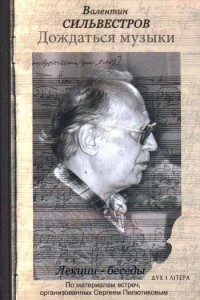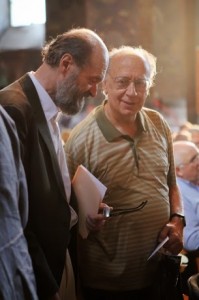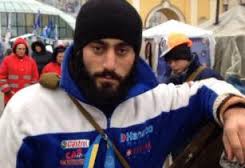I write this post in some haste. Just a few minutes ago Russian president Vladimir Putin publicly acclaimed Sunday’s vote, rejected as illegal by Ukraine and the international community, of the Crimean peninsula’s self-proclaimed referendum in favour of joining the Russian Federation. Since the change of régime in Kiev and flight of former president Viktor Janukovych, Western public opinion has clearly been divided as to how to respond to the crisis and Moscow’s de facto annexation of Crimea. Despite the apparent unity demonstrated at governmental level by the European Union and North America, a number of dissenting voices (including former German Chancellor Gerhard Schroeder) have not been slow to accuse the West of mis-managing the situation and alienating Russia. Others, particularly in the ‘alternative media’ and blogosphere, have gone further in laying the blame for the current predicament with the US on account of the heavy-handed diplomatic actions of individuals such as Assistant Secretary of State for European Affairs Victoria Nuland during the final phase of the Maidan Square protests that led to the ousting of Janukovych, seen as a Western-sponsored coup led by Nazi militias.
This blog is obviously not the place to undertake a political analysis of the crisis, but it is difficult not to be surprised at some basic misunderstandings of the situation that have transpired in the statements even of experienced commentators such as American ex-budget director David Stockman (on http://www.kingworldnews.com) who are currently arguing that the crisis is of no relevance to the US, that the West is simply meddling in others’ business and that Crimea is in any case historically Russian. The latter is of course true, it being well-known that the peninsula was only transferred from Russia to the Ukraine in 1954 by Nikita Krushchev. Two elementary facts however appears to be insufficiently understood by those who see the present crisis primarily as the result of Western arrogance: i) the international condemnation of Sunday’s referendum is based principally on its contravention of the Ukrainian constitution which does not allow such votes for secession without consultation of the country as a whole. Not to recognize its validity is not merely a hypocritical refusal of the principle of self-determination on the part of the international community ii) it is surely beyond dispute that the Russian Federation is in violation of its obligations as a signatory to the 1994 Budapest Memorandum in which the Ukraine’s territorial integrity was guaranteed, in return for which the Ukraine agreed to relinquish its nuclear arsenal. That this last point is crucially important in terms of the present power dynamics between Kiev and Moscow ought to be self-evident.
This having been said, a number of questions do arise in the present dramatic situation whose complexity defies a simplistic reading. Is it possible that the international community (admittedly provoked by the current Russian leadership) has allowed itself to become trapped within a false dichotomy of East-West confrontation when what is needed is a more holistic approach? Is fast-tracking the Ukraine’s process of affiliation with the EU not playing into the hands of the hawks in Moscow? Why should the belligerent foreign policy of the current Russian authorities be crudely equated with the attitude of the Russian people as if there were no internal differences of opinion within Russia itself (despite undeniable public support for Putin a sizeable anti-war march was held in the Moscow on March 15)? And does it logically follow that being in solidarity with the new government in Kiev necessarily means being perceived as ‘anti-Russian’, with no possible third way?
In this respect, a thought-provoking document that transcends this ‘either-or’ logic has just been released by a group of Ukrainian intellectuals, first among them being the Ukraine’s most prominent living composer Valentin Silvestrov (1937-), a hero of this blog (in honour of whose 75th birthday in 2012 I wrote my choral cycle Spiritus divinae lucis gloriae). This ‘letter of the Ukrainian intelligentsia to their Russian friends’, the original of which can be found over at the website of publishers Duh i litera , is worth quoting in full:
‘To participants of the congress of the intelligentsia “against war, against Russian self-isolation, against the restoration of totalitarianism .”
Dear friends,
Today our people a common danger hangs over our nations. The current government of the Russian Federation, in its mad quest to revive a semblence of the Soviet Union and to halt democratic processes in Eastern Europe , has placed our countries on the brink of a large-scale geopolitical catastrophe. In the interests of their authoritarian rule they violate your and our right to a dignified life, destroying pan-European and global security mechanisms one after another .
Today is required the defense not only of the integrity of the Ukrainian state, but also the honour and reputation of Russian culture. Therefore, rejecting Putin’s version of Russia, we, Ukrainians, consistently defend and support another Russia. The Russia of the fighters for freedom of conscience – the Russia of Chaadayev[1] and Vladimir Soloviev[2] , Akhmatova and Pasternak , Sakharov and Grigorenko[3], Natalia Gorbanevskaya[4] and Anna Politkovskaya. The Russia that you represent to us .
We understand that today is particularly difficult for you . Yet surely your voice will be heard – both in Russia itself and in the Ukraine, and in the world. The civil society of the civilized world can and must be stronger than the Kremlin propaganda machine. The truth about the new democratic Ukraine must be connected with the truth about a genuine, democratic Russia. Together we and you are called to spread one and the other.
The brotherhood of the peoples of Europe grew and acquired strength in the common struggle for freedom. “For our freedom and yours “, cried Herzen and his Polish friends. This call sounded in Spain in the 1930s and in Red Square on August 25, 1968[5]. Today’s resistance to the Russian occupation of the Crimea – is also a fight for “our freedom and yours .” In this resistance we are united .
The voice of truth shall be heard!
We thank you for your initiative and solidarity,
[1] Russian writer and philosopher (1794-1856).
[2] Philosopher-theologian (1853-1900), “pioneer and example of dialogue between Eastern and Western Christians” (Pope John Paul II), regarded by Catholic theologian Hans Urs von Balthasar as second only to Thomas Aquinas as a systematic thinker. Soloviev spent the last years of his life in dialogue with Catholicism over his ideas for bringing Russian Orthodoxy back into communion with Rome. Author of the remarkable Story of the Antichrist, his final work.
[3] Petro Grigorenko (1907-1987). Former Red Army General who became a dissident in the 1960s, campaigning for the rights of Crimean Tatars. Confined to Soviet mental institutions. Stripped of Soviet citizenship in 1977 while visiting the US, subsequently barred from entering the Soviet Union. Became a worshipper at the Russian Orthodox Cathedral in Manhattan during the last decade of his life.
[4] Poetess and dissident (1936-2013). Natalia Gorbanevskaya was among the eight women and men who on August 25, 1968 unfurled a banner in Red Square with the words ‘For our freedome and yours’ in protest at the Soviet invasion of Czechoslovakia. Subsequently punished in psychiatric wards by being force-fed anti-psychotic medication haloperidol in the ensuing years before emigrating to Paris in 1975. Author of the book Red Square at Noon.
[5] See n.4.
(Translation and notes mine)
This plea in favour both of guaranteeing the security of the Ukraine and of honouring the best traditions of Russian culture surely has to count as one of the sanest declarations of recent weeks. It also demonstrates that, while the existence of problematic extreme-right elements within the forces that overthrew Janukovych needs to be acknowledged, Moscow’s stereotypical portrayal of Maidan as the work of nationalist fanatics and neo-Nazis is a gross over-simplification for propaganda purposes. That the more extreme Western critics of EU and American policy should have bought into this analysis simply shows their naiveté with regard to the Kremlin’s information strategy.
That Valentin Silvestrov should be a prominent signatory of this appeal to the Russian intelligensia should come as no surprise to anyone familiar with his catalogue. While he like many other Ukrainian intellectuals appeared among the Maidan protestors, Silvestrov can hardly be construed as being a Russophobe of any sort. Russian poetry by Pushkin, Lermontov, Blok, Jessenin, Mandelstam and others has inspired many of his most significant works such as his 24 Silent Songs (1974-1977) and Stufen (1982 – in my opinion one of the greatest of all twentieth-century song-cycles for voice and piano). Like Arvo Pärt – a great admirer of his work -, he has written choral music setting texts both in Latin and in Church Slavonic, embodying the dual identity of the Ukraine as shaped both by Catholicism and Orthodoxy; similarly to his Estonian colleague, he is a composer who does not attempt to choose between East and West, but embraces both.
Silvestrov has now written three short diptychs connected in Maidan Square in Kiev, all intended for a cappella choir, the tone becoming increasingly sombre with the unfolding of the epochal events in the Ukrainian capital. Sketch versions of the three sets sung and played at the piano by the composer himself in his inimitable style can be heard on the website of Duh i litera; together they constitute a moving but sobering chronicle of history in the making.
The first, written at the turn of the year, consists of a ‘Hymn’, a variant on the Ukrainian anthem sung by the crowds in Maidan Square featuring an evocation of the ringing of the alarm bell of St Michael’s monastery , together with a ‘Christmas Psalm’.
http://duh-i-litera.com/prysvyata-majdanu-tvory-valentyna-sylvestrova/
If these two pieces are relatively optimistic in tone, the second couple of settings is distinctly darker, composed in memory of Sergei Nihoyan, a young ethnic Armenian worker from the eastern Ukrainian village of Bereznovativka born in 1993, who was one of the first fatal victims of the Euromaidan protests during gunfire clashes on January 22
It is not hard to see why Nihoyan’s tragic death should have moved the composer; the young protestor had come to public attention for having recited the poetry of Ukrainian poet Taras Shevchenko (1814-1861), whose bicentenary is being celebrated this year and whose work had been put to music by Silvestrov on multiple occasions in the past. In response to the killing of Nihoyan, Silvestrov set the lines of Shevchenko declaimed by the victim – ‘i vam slava, sini goury…’ (‘Glory to you, blue mountains’), together with the prayer ‘s sviatimi upokoi‘ (‘Peace with the saints’)
http://duh-i-litera.com/pamyati-serhiya-nihoyana-novi-tvory-valentyna-sylvestrova/
The latest diptych, a ‘Hymn’ and ‘Lord’s Prayer’, was penned in response to the large-scale violence of February 18-20: Silvestrov’s voice and piano simulation of this poignant work is accompanied by an unsigned commentary which sounds a note of hope even in what are turning out to be increasingly dramatic circumstances:
Эти звуки оплакивания воплощают неизгладимую скорбную атмосферу тех дней, и, в то же время, из них – «путем зерна» – рождается тихое ожидание Пасхи.
These sounds of grief embody the unforgettably mournful atmosphere of those days, yet at the same time a quiet anticipation of Easter arises from them “like a seed”
http://ru.duh-i-litera.com/novyiy-diptih-valentina-silvestrova/
____________________________
As I write it has to be said that this ‘anticipation of Easter’ seems distinctly faint at the moment in the light of hard geo-political reality, while the shadow of a rapidly approaching Good Friday looms ominously over the Ukraine. The Ministry of Defence in Kiev has now authorized the use of firepower by its troops in the Crimea in reaction to the killing of a soldier by masked gunmen in Symferopol. The intellectuals’ congress “against war, against Russian self-isolation, against the restoration of totalitarianism ” is scheduled for tomorrow, March 19. Whether anyone is listening is another matter.
P.S. I would like to conclude with a personal offer. As a token gesture in honour of Valentin Silvestrov I have made a handful of recordings of some of his piano works which can be heard on my YouTube channel . If any church or other institution would like to use this uniquely meditative music as the basis for an ecumenical musical vigil in favour of peace and reconciliation, or if other musicians appreciate of Silvestrov’s work would like to collaborate in such an endeavour, please contact me. As soon as possible.
Valentin Silvestrov (1937 -) Two Epitaphs
Valentin Silvestrov Nostalghia (2001)
Valentin Silvestrov Melodie (2001)
Valentin Silvestrov Hymne (2001)
Valentin Silvestrov Intermezzo
Valentin Silvestrov “Benedictus” (Night)



Lovely recording, Peter… Listening now to Valentin Silvestrov (1937-) Two Epitaphs: Barcarolle/Wiegenlied (2001)… Why don’t we do something at the ACP?
This is a great read! Keep on posting blogs like this Peter Bannister.
Also, you might want to consider http://goo.gl/xgo2tS. I’ve tried it and it works for me!
I’ll wait for your next write-up!